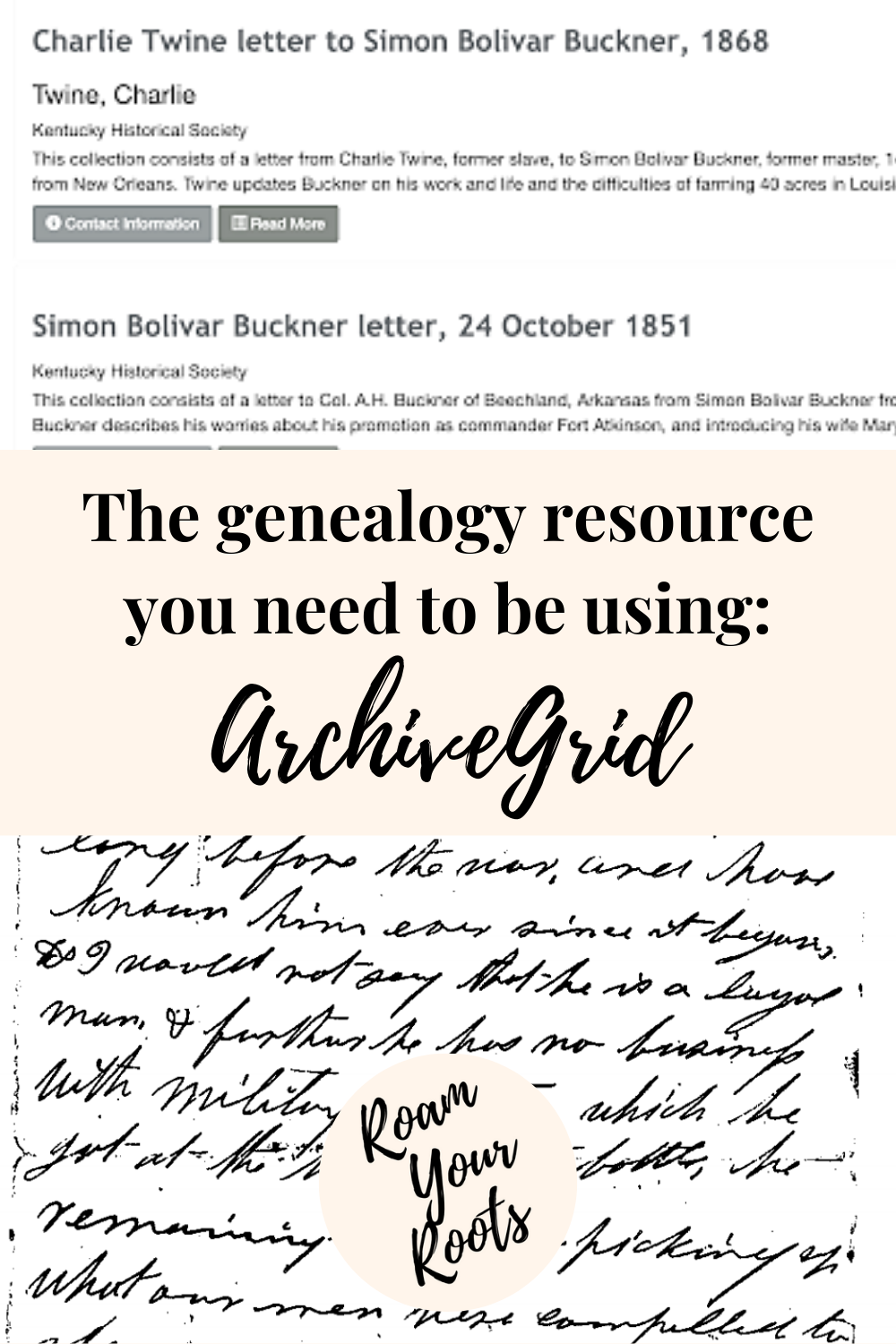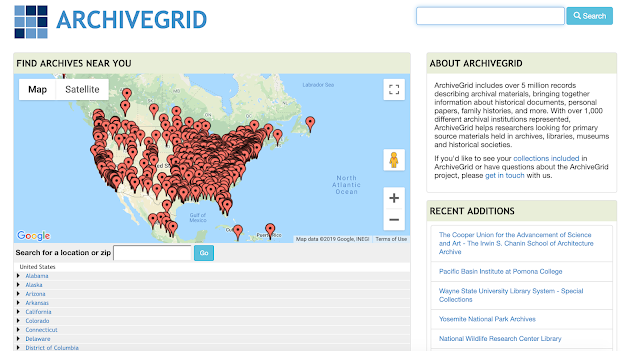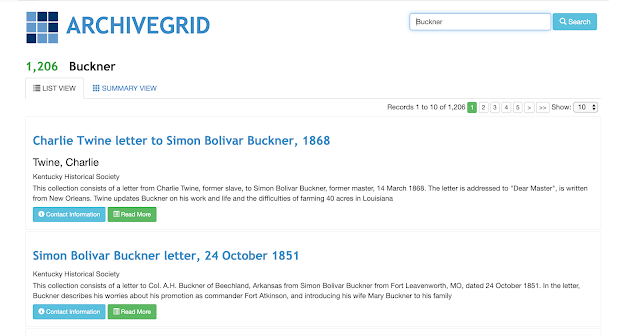ArchiveGrid: The Genealogy Resource you NEED to Use
As genealogists, we've all been there. You think you've exhausted all resources. No more hints are coming up on Ancestry. You've found all the land patents your ancestors ever applied for. You've exhausted the records available on FamilySearch.
You want to visit the historical society in the rural town your great-great-grandma lived in, but that costs money, and time, and for what? Maybe they don't even have anything. You'd email them and ask, but they charge a fee for research.
So what is a genealogist to do in this predicament?
If you are scholar of any sort, you've probably heard of WorldCat: "the world's largest library catalogue". WorldCat is just that: an online catalogue of every book and journal article that have ever existed, telling you where you can get your hands on a copy, both online and offline.
WorldCat is owned by the Online Computer Library Center (OCLC), an organization "dedicated to the public purposes of furthering access to the world's information and reducing information costs".
Sounds enticing right?
Well, if WorldCat is the online catalogue for the every-day scholar, the OCLC has also launched an online catalogue tailored to the not-so-everyday historian and genealogist.
ArchiveGrid.
Fortunately for us, ArchiveGrid is a pretty thorough catalogue, including listings everywhere, from places like the East Midwood Jewish Center to the Library and Archives of the United States Marine Band, and everything in between.
Unfortunately for us, it is a little hard to navigate and can cause some definite frustration when you aren't immediately met with good results. The most important thing to remember is that a service like this is something you use to see if something is out there, and it very well may be the case that the record you're hoping for just simply doesn't exist. And that is frustrating. You'll find yourself going in circles, typing in different key words and hoping to get different results. So to save yourself some time and frustration, just remember: maybe there simply isn't any record in the catalogue relating to your ancestor.
That isn't to say that there absolutely won't be little nuggets of genealogical gold awaiting you. Let me give you an example of one of the most exciting records I've ever found, and walk you through how I found it.
First, go to https://researchworks.oclc.org/archivegrid/. This is the homepage.
You'll be met with an interactive map with red pins on it. This map tells you the locations of all the holdings that have submitted their collections to ArchiveGrid to be listed. Remember that historical societies, libraries, universities, and other institutions are still being invited to submit their collections, so new search results can be added at any time.
From this map you can search specific collections. For example, if you think that Auburn University must have some sort of record of your grandfather, you can zoom into Alabama (or select it from the drop down list below the map), select Auburn University, and look at the specific sorts of collections they've submitted to ArchiveGrid.
If you don't have any specific geographic location or institution in mind and just want to see what comes up, you can do that in the 'search bar' in the upper right hand corner.
I wanted to search for any records related to Buckners - pretty broad, but I just wanted to know what was out there. So I typed in 'Buckner' and pressed search.
It tells me that 1,206 results came up, and lists them below. There are various search filters you can add when typing something into the search bar; for example, if I wanted to search for 'Buckner' but didn't want to see any of the hundreds of records related to the famous Civil War solider and politician from Kentucky named Simon Bolivar Buckner, I could type 'Buckner NOT Bolivar' and it would filters these out. All the little search filters you can add like this are explained by Archivegrid here.
Results that appear after searching 'Buckner' in the search bar. Note 'list view' and 'summary view' below the results number
You'll see below the results number there are two tabs: list view and summary view. If you click on summary view, it will show the various other search terms related to the results and lets you narrow your search.
Summary View of the Buckner search results
For example, if I was looking for a Buckner who I knew worked in politics (such as Simon Bolivar Buckner) I would go over to topics and click 'Politics and government'. If I was looking for any mention of a Buckner somehow related to the Jones family (there is an abandoned plantation near Williamsburg, VA once owned by the Buckners and then ultimately sold to the Jones - you can watch a vlog of my visit there) then I can click 'Jones' under the People category and that will give me all the records that mention both Buckners and Jones.
In this particular case, the Buckners I was interested in researching all lived in Missouri. There is the option to filter by place, but as you'll notice the options are a little convoluted. For example, in the screenshot above it lists "United States - Civil War, 1861-1865" under places, which doesn't really make any senses. There can also be multiple entries for the same states.
Instead, try filtering your results by using the 'Archives Locations' options. In my case, it tells me that the archives location with the most records on Buckners is in Columbia, MO, which is perfect because I am interested in the Missouri Buckners.
When I click on this, I scroll through all the results that come up. Take a look:
I make note of the ones that might be of use. I know the 'Sarah Ann Reed Sturgeon De Forest scrapbook, ca. 1920-1956' must not mention my Buckners, as they all left Missouri by then. But perhaps the 'Washington County, MO tax assessment book, ca. 1854-1855' would include some of my Buckner ancestors, as that is exactly where some of them they lived at that time!
Remember, as stated above, the most important thing to remember when searching ArchiveGrid is that you could be searching for something that doesn't exist. Don't feel discouraged if the results don't come back with a diary written by your 4th great grandfather. Instead, keep an eye out for other signifiers that could lead you to undiscovered information: dates and places. If Abijah lived in Sevier Co, TN in 1820, and a result regarding land owners in Sevier Co. between 1815 and 1825, this could be a spot on match for you.
For example, I searched for 'Joel Buckner' on ArchiveGrid. Joel was my 3rd great-grandfather and, long story short, he lived a pretty lowly existence. He murdered his friend, was indicted, got off easy, divorced his wife, etc.
But it wasn't until I found a jaw-dropping letter on ArchiveGrid that I realized just how lowly his existence was.
I noticed the fourth result ArchiveGrid gave me hailed from the State Historical Society of Missouri and it is dated to the exact time period Joel was on his little crime rampage - the 1860s, in Missouri. I had never heard of Francis Marion Williams, but the timeframe added up, so I clicked on it.
It navigated to a PDF made by the State Historical Society of Missouri (SHSMO) describing the collection. Note that this won't always happen when you click on a result; it depends who the collections holder is. Luckily for me and all the other Missouri researchers, SHSMO does a great job and thoroughly describing the collections they have.
The description tells me the collection is an assortment of letters between civil war captains based out of Ironton. I couldn't believe it. Ironton, an obscure little community nestled amongst the Ozarks of Iron County, MO, was exactly where my Buckners lived. And there was only one Joel Buckner there at the time: my Joel Buckner.
Unfortunately, the description of the collection only lists a 'Buckner, Joel' as being one of the subjects mentioned in the collection of letters, but it doesn't say in what capacity. So, I emailed the State Historical Society of Missouri in Columbia, referencing this collection and noting that I'm interested in any papers within the collection regarding Joel.
Note: At the time, research services at SHSMO were free. Now they cost a bit, but at least with ArchiveGrid I can do a comprehensive search of the records rather than blindly paying a research fee only to be told that there are no records about my ancestors.
A few days after my email, I receive a response.
And I nearly burst into tears after seeing what was attached. It was a handwritten letter from 1865 but the wonderful archivist at SHSMO also gave me the transcribed version. Take a look:
The most scathing and raw character reference to Joel I could ever have imagined: "I have known Mr. Buckner long before the war, and have known him ever since it began, & I would not say that he is a loyal man".
Turns out Joel had been following Civil War troops around, stealing their clothing and guns, and got in trouble for it. For some reason, Beveridge, Grosnevor, and Lonergan didn't think this was fair, and that Joel was being "persecuted more for his name" - a claim that leads me to believe everyone in town knew the shenanigans Joel (and perhaps other Buckners) were capable of.
Captain Robert Lindsay was clearly put off by this statement of Joel's loyalty, but begrudgingly gave the clothing and arms back to Joel after being ordered to by his higher-ups.
This is a record that I would have never found on Ancestry, FamilySearch, or Newspapers.com. It goes to show the immense and unbelievable detail available in the holdings you can find on ArchiveGrid if you have an open mind and a little bit of patience.
Have you found any jaw-dropping things on ArchiveGrid? Broken down any brick walls? Share this tutorial, and share your finds so others are encouraged to search the collections themselves!







